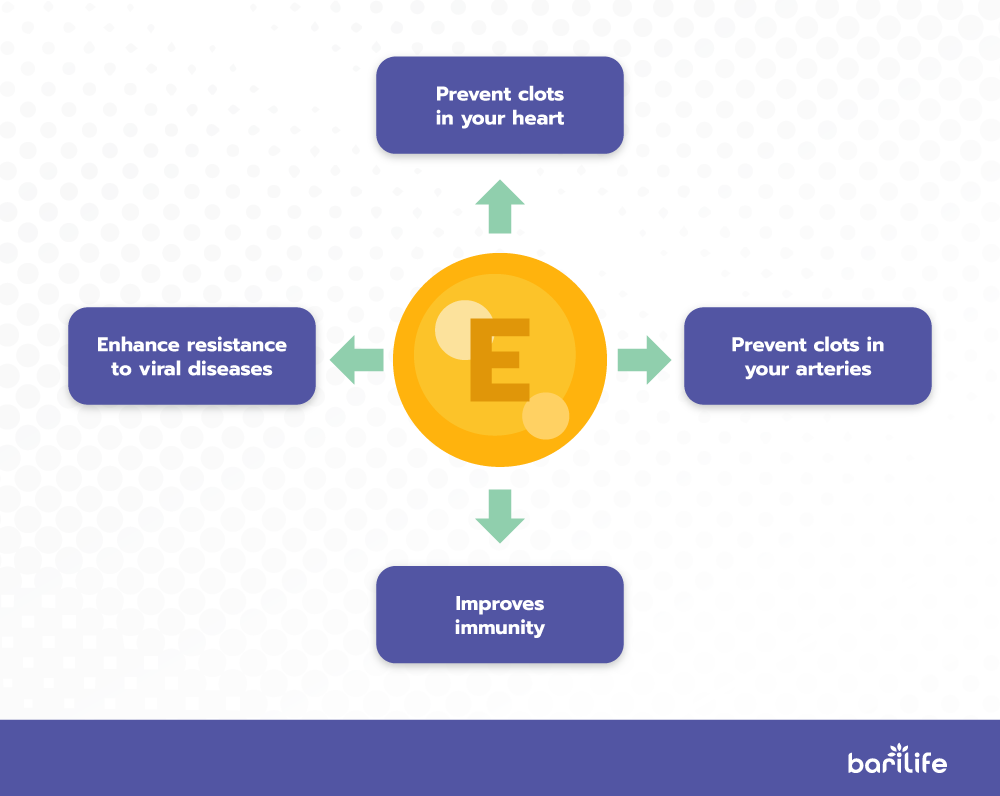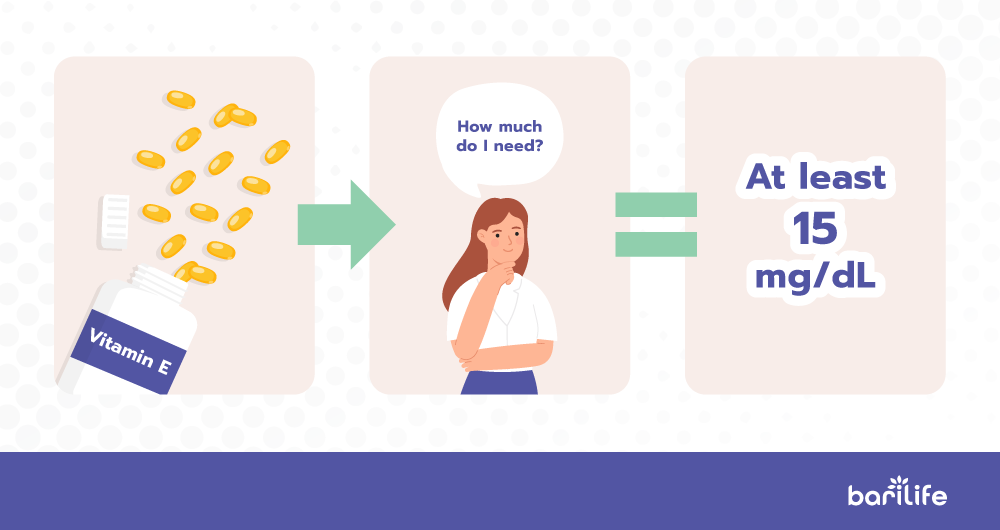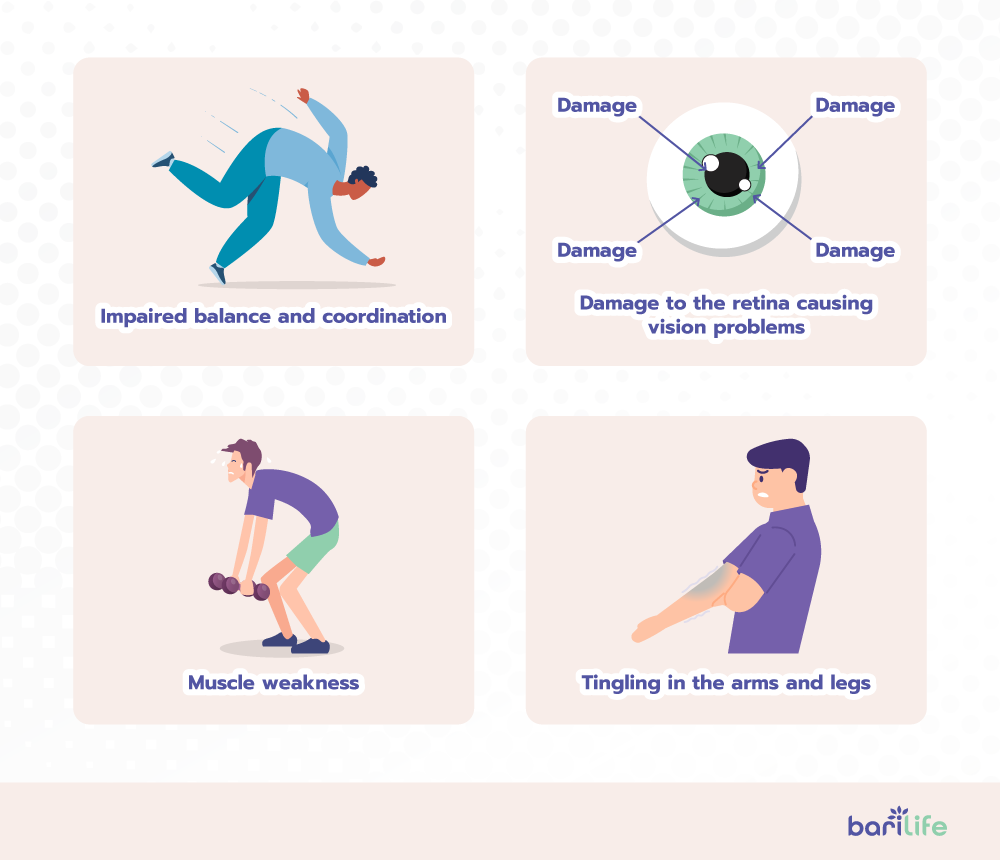When learning about all of the vitamins and minerals you need to take after having bariatric surgery, there is a lot of information to keep in mind. It is crucial that you get 100% of what your body needs for so many vitamins and minerals, but it can be hard to keep track of them all.
Here, we will break down one important vitamin, vitamin E. We will discuss the main functions of this vitamin, the intake guidelines, and the signs and symptoms of deficiency to monitor for.
What are the main functions of vitamin E?
Vitamin E is a fat-soluble vitamin, which means it requires the presence of dietary fat in order to be absorbed. Harvard’s T.H. Chan School of Public Health notes that the form of vitamin E which is used in the body is called alpha-tocopherol.
Vitamin E has various roles in the body. According to the National Institutes of Health Office of Dietary Supplements, vitamin E acts as an antioxidant. Damage to cells inside your body can occur from molecules or atoms called free radicals, which our bodies can form when they convert the food we eat into energy.

We can also be exposed to free radicals in our environment, such as from cigarette smoke or air pollution. Free radicals can cause damage to your DNA, leading to diseases such as diabetes and heart disease. One of the primary functions of vitamin E is to protect your cells from free radicals, preventing this damage from occurring.
According to Harvard’s T.H. Chan School of Public Health, vitamin E has also been shown to prevent clots from forming in your heart and arteries. This leads to improved heart health and reduced risk of a heart attack.
Vitamin E also improves our immunity. According to an article published in the Sultan Qaboos University Medical Journal, vitamin E intake stimulated the body’s immune response. In elderly patients, vitamin E supplementation was also shown to enhance resistance to viral diseases.

What are the guidelines for vitamin E?
The American Society for Metabolic and Bariatric Surgery (ASMBS) recommends that patients who have undergone a laparoscopic adjustable gastric band procedure, a sleeve gastrectomy, a Roux-en-Y gastric bypass, or a biliopancreatic diversion/duodenal switch take a vitamin E supplement daily.
The recommended dose is 15 mg/dL. It is important to ensure that the daily multivitamin that you are taking contains an adequate amount of vitamin E to prevent deficiency.

The Harvard T.H. Chan School of Public Health notes that women who are lactating may need slightly increased intakes of vitamin E. If you are lactating, we recommend speaking to your doctor to ensure that you are getting the right amount of vitamin E for your body.
One thing to note, according to the National Institutes of Health Office of Dietary Supplements, is that vitamin E supplements may cause increased bleeding in people taking anticoagulant or antiplatelet medications, such as Warfarin.
If you are taking these medications, it is important to let your doctor know this before starting vitamin E supplementation.
What about vitamin E deficiency?
The good news about vitamin E is that deficiency is rather rare in the post-bariatric surgery population. According to the ASMBS, 2.2% of patients who underwent weight-loss surgery were found to have a deficiency in vitamin E.
Given the fact that vitamin E requires dietary fat to be present for absorption, individuals who do not absorb fat properly are most likely to be deficient in this vitamin.
According to Harvard’s T.H. Chan School of Public Health, people with pancreatitis, cystic fibrosis, or celiac disease fall into this category.
According to Oregon State University’s Linus Pauling Institute, symptoms of vitamin E deficiency are mainly neurologic. Signs of a deficiency to watch out for include ataxia (impaired balance and coordination), muscle weakness, and peripheral neuropathy (numbness or tingling in the arms and/or legs).
Vision problems, caused by damage to the retina of your eye, may also occur. It is important to note that if you experience any of these symptoms, you should contact your doctor for further testing.

In summary
Vitamin E has many important roles in the body. It can improve your immunity, and may help to prevent the development of chronic diseases such as diabetes and heart disease.
While only 2.2% of individuals who have had weight loss surgery are deficient in vitamin E, it is important to ensure that you do not fall among that number.
Side effects of vitamin E can be serious, so taking a multivitamin that has the recommended dose of vitamin E for individuals who have undergone weight loss surgery is imperative.
Luckily, Bari-Life multivitamins contain 100% of the ASMBS recommended daily value for vitamin E, along with all of the other vitamins and minerals your body requires. Visit the vitamins section of our website to browse all of our offerings and choose the best vitamin for you.



What are your tips and tricks to post-bariatric success?